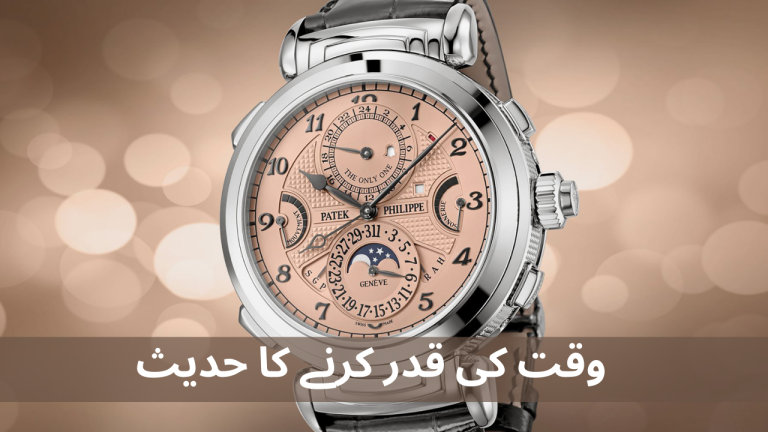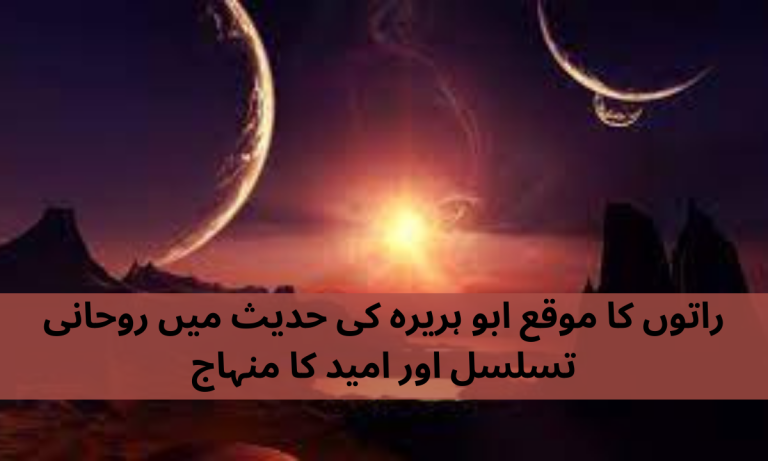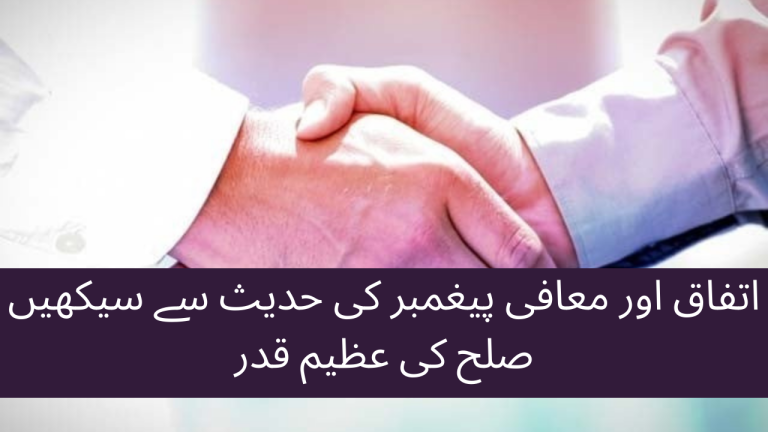Allah Taala K Wahdaniyat K Baray May Rasoolullah Ki Hadees

Allah Taala K Wahdaniyat K Baray May Rasoolullah Ki Hadees
رواه البخاري (وكذلك النسائي)
About This Hadees In Araibi ,Urdu And English
In Araibi
هذا الحديث هو حديث من رواية أبي هريرة (رضي الله عنه) عن النبي محمد صلى الله عليه وسلم، حيث قال
“قال الله تعالى: كَذَّبَنِي ابْنُ آدَمَ وَلَمْ يَكُنْ لَهُ ذَلِكَ، وَشَتَمَنِي وَلَمْ يَكُنْ لَهُ ذَلِكَ، فَأَمَّا تَكْذِيبُهُ إِيَّايَ فَقَوْلُهُ: لَنْ يُعِيدَنِي كَمَا بَدَأَنِي، وَلَيْسَ أَوَّلُ الْخَلْقِ بِأَهْوَنَ عَلَيَّ مِنْ إِعَادَتِهِ، وَأَمَّا شَتْمُهُ إِيَّايَ فَقَوْلُهُ: اتَّخَذَ اللَّهُ وَلَدًا، وَأَنَا الْأَحَدُ الصَّمَدُ، لَمْ أَلِدْ وَلَمْ أُولَدْ، وَلَمْ يَكُنْ لِي كُفُوًا أَحَدٌ.”
يُؤكد هذا الحديث على أهمية التعرف على توحيد الله الكامل وفرادته. يسلط الضوء على الخطأ في تنسيب النسل إلى الله أو إنكار قدرته على إعادة الخلق، حيث إن هذه الأفعال هي أساسًا خاطئة وتجاهل لجوهر الله الإلهي. يعمل الحدي
In Urdu
یہ حدیث ابو ہریرہ (رضی اللہ عنہ) سے روایت ہے جس میں پیغمبر محمد (صلی اللہ علیہ وآلہ وسلم) کا فرمایا کہنا ہے:
“اللہ تعالی نے فرمایا: انسان کی اولاد نے مجھ پر تکذیب کی، جبکہ اس کا کوئی حق نہ تھا۔ وہ میری تنقید کرتے رہے، جبکہ اس کا کوئی حق نہ تھا۔ جیسے کہ ان کی تکذیب میں یہ بات ہے کہ میں اُنے اسی طرح دوبارہ پیدا نہیں کردوں گا جیسے کہ میں نے ان کو پیدا کیا تھا، جبکہ پہلی بار کی تخلیق میرے لیے دوبارہ کرنا کسی بھی لفظ کی تخلیق کے لئے آسانی سے نہیں ہے، اور ان کی تنقید میں یہ بات ہے کہ میں نے ایک بچہ پیدا کیا ہے، جبکہ میں ایک ایسا بے شریک، ہمیشہ کے لئے پناہ ہوں۔ میں نے کسی کو پیدا نہیں کیا اور نہ میرے پیدا ہونے کا کوئی سابقہ نہیں، اور میرا کوئی موازنہ نہیں کرتا۔”
یہ حدیث اس بات کی اہمیت کو زیرِ تاکید لاتی ہے کہ اللہ کی مطلق ایکتراکیت (توحید) اور اس کی انوکھائی کو پہچاننے کا اہمیت دیتی ہے۔ اس میں اللہ کو اولاد کو جمال دینے یا اس کی توانائی کو ناپید کرنے کی غلطی کو نشان دیتی ہے، کیونکہ دونوں کارروائیاں بنیادی طور پر غلط اور اللہ کی مقدست کے خلاف ہیں۔ یہ حدیث اس بات کی یاد دلاتی ہے کہ اسلام میں اللہ کی ایکتراکیت کے عقائد کو سمجھنے اور برقرار رکھنے کی اہمیت کو بنیادی روشنی میں رکھتی ہے۔
In English
This Hadith is a narration from Abu Huraira (may Allah be pleased with him) in which he reported that the Prophet Muhammad (peace be upon him) said:
“Allah, the Most High, has said: ‘The son of Adam denied Me, though he had no right to do so. He reviled Me, though he had no right to do so. As for his denying Me, it is his statement that I will not recreate him as I began him.
while the initial creation is not easier for Me than to recreate him. As for his reviling Me, it is his statement that I have begotten a child, while I am the One, the Everlasting Refuge. I begot not nor was I begotten, and there is none comparable to Me.'”
This Hadith emphasizes the importance of recognizing Allah’s absolute oneness (Tawheed) and His uniqueness. It highlights the fallacy of attributing offspring to Allah or denying His ability to recreate us, as both actions are fundamentally incorrect and disrespectful to the divine essence of Allah. The Hadith serves as a reminder of the importance of understanding and maintaining the belief in the oneness of Allah in Islam.
Benefits Of The Hadees
The Hadith that affirms Allah’s Oneness and uniqueness has several important benefits and lessons for Muslims:
- Strengthening Belief in Tawheed (Oneness of Allah): This Hadith reinforces the fundamental Islamic belief in the absolute oneness and uniqueness of Allah. It reminds Muslims of the importance of maintaining a pure and uncompromising belief in the oneness of Allah.
- Rejecting Shirk (Associating Partners with Allah): The Hadith unequivocally rejects the concept of associating partners with Allah or attributing offspring to Him. It serves as a powerful reminder against the sin of shirk and reinforces the prohibition of such beliefs and practices in Islam.
- Understanding Allah’s Attributes: This Hadith highlights key attributes of Allah, including His eternal existence, His uniqueness, and His uncreated nature. It helps Muslims develop a deeper understanding of Allah’s divine qualities.
- Affirming Allah’s Divine Essence: The Hadith emphasizes that Allah is unique and incomparable, with no equal or equivalent. Believers are reminded that Allah’s divine essence cannot be compared to anything in creation.
- Reinforcing Monotheism: It strengthens the concept of monotheism (Tawheed) in the minds and hearts of Muslims, promoting a clear and uncompromising belief in the oneness of Allah.
- Guidance Against Misconceptions: In a world with various religious and theological beliefs, this Hadith provides clear guidance for Muslims, protecting them from misconceptions and deviations related to the nature of Allah.
- Encouraging Proper Worship: Understanding the oneness of Allah encourages Muslims to worship Him alone and seek His guidance and forgiveness exclusively, without the interference of intermediaries or associates.
- Promoting Humility and Submission: Recognizing Allah’s uniqueness and transcendence encourages humility and submission in the hearts of believers, reminding them of their dependence on Allah.
- Protecting Against False Beliefs: The Hadith serves as a shield against false beliefs and ideologies that contradict the monotheistic principles of Islam.
- Spiritual Reflection: Muslims can use this Hadith for spiritual reflection and contemplation, deepening their faith and devotion to Allah.
In summary, the Hadith affirming Allah’s Oneness and uniqueness is a cornerstone of Islamic theology. It reinforces the core belief in the oneness of Allah, provides guidance against shirk and false beliefs, and encourages a profound understanding of Allah’s divine attributes. It serves as a source of spiritual strength and guidance for Muslims in their faith and worship.





